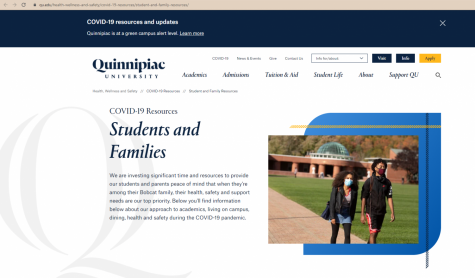Quinnipac’s 2021 Spring semester plan
January 12, 2021
Quinnipiac University has outlined the plans and methods for the move-in process for the Spring 2020 semester.
An email sent by Dr. David Hill, a senior medical advisor on the university’s COVID-19 Task Force, described “new or changed” protocols Quinnipiac is adopting as a change from the way the school handled the virus and its effects in the previous Fall semester.
The eight new protocols include dedicated nurses to support students who contract the coronavirus, stricter penalties for students who do not check-in for their tests, and self-care days throughout the semester since there will be no spring break this year.

Hill also touched on COVID-19 testing, namely pre-arrival testing that the university had spoken about previously and post-arrival testing set to start once students arrive on campus and throughout the semester. While on-arrival testing would be conducted similar to the Fall semester’s protocol, Quinnipiac is making one fundamental change to the frequency students would be tested early on. Hill said, “Based upon a new state requirement, we will be testing ALL undergraduate students weekly through Feb. 28.” This means that for next month, all students would be tested, instead of the usual near-quarter percent of students tested every week last semester. However, that system is set to resume after February, Hill added. “We will again conduct weekly surveillance testing of approximately 20% of our student population after February, through the remainder of the semester.
Also like the Fall, all students arriving at the campus will start their classes online and not be allowed to leave campus “…from the time a student moves into their on- or off-campus housing until the start of in-person classes on Feb. 1.” Under these restrictions, students will not be able to physically interact with anyone outside their “family unit”, or roommates, and dining will fall under a take-out system only. Hill further stated that seating at in-dining locations will be closed and inaccessible until the end of the quarantine period.
Alongside this, Hill states “library and study spaces on all campuses will be open to students during the ‘containment’ period, but only for independent study or to provide a quiet place to attend your online class (no group gatherings or meetings). Classrooms can also be used as study spaces during the “containment” week before Feb. 1.”
With regard to other facilities, Hill added, “Exercise and fitness facilities will be closed during the ‘containment’ period, and we anticipate we can safely open and operate the facilities at the end of the period. The bookstores will be open, but patrons must observe the posted capacity limits and physical distancing. There will be no impact on the arrival of students’ textbooks. Mailroom operations will follow standard hours.”
For athletes at the university, Hill said, “Student athletes will continue to follow specific guidelines related to both testing and the ‘containment’ period as prescribed by coaches, the Athletic Department and NCAA policies.”
Vaccines for COVID-19 are being increasingly released to wider parts of the nation’s population but as of now are only available to a small portion of the student population. As the semester begins and time moves on, Quinnipiac University may release more information on how all students may be able to get vaccinated once an opportunity is available.
Until then, student life will most likely remain similar to the Fall experience. But with university experts having hosted two panels on COVID-19 vaccines, the discussion is already ongoing, and news of change may come sooner rather than later.
Check out q30tv.com and download the Q30 TV mobile app in order to stay updated on happenings around the campus.









